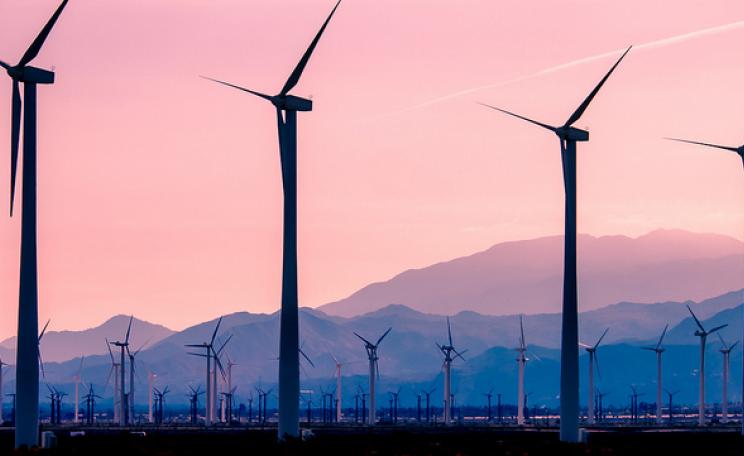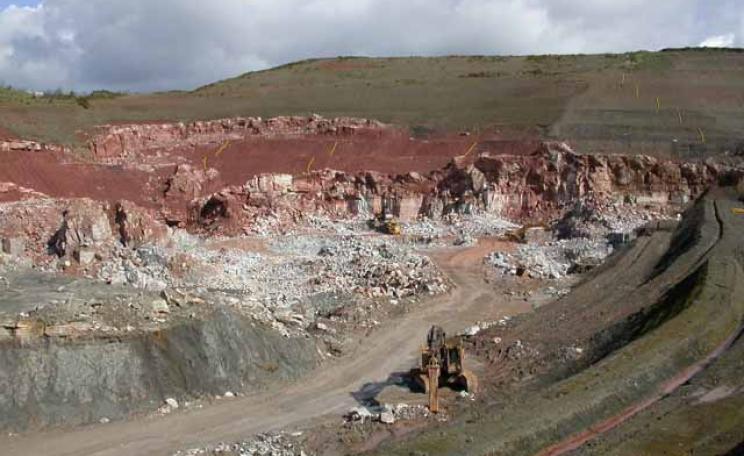The 'dark side of digitalisation', and its consequences for the environment and for communities impacted by mining, is noticeably absent from enthusiastic public discussions about future technologies and 'green' growth.
Is post-Brexit Britain set to follow in the footsteps of the European Mining Boom?
Our original (Br)exit date of the 29 March has come and gone and the UK’s future trajectory remains full of uncertainties.
This is the second article in a three part series. Read part one here.
The effect that leaving the EU will have on mining and extractivism in the UK also remains unclear. But the recent expansion of mining throughout Europe gives us a strong indication of how, and why, a future mining boom in the UK might unfold.
Mining multinationals
Many businesses are worried about the implications of leaving the EU. Brexit is not all good news for mining multinationals.
Fear of the prospect of a no-deal Brexit has caused business investment in the UK mining sector to plummet by nearly one-sixth in a year, echoing the wider fall in the British economy. In addition, leaving the single market will disrupt goods and services supply, with higher tariffs for mining products in the EU.
The 'dark side of digitalisation', and its consequences for the environment and for communities impacted by mining, is noticeably absent from enthusiastic public discussions about future technologies and 'green' growth.
But mining is one industry that stands to benefit, both in terms of profits and opportunities for London-based mining companies operating abroad, as Brexit threatens to deregulate the UK economy, slash environmental and worker protections and re-orientate the UK’s trade relations.
At home, well-placed mining multinationals have been lobbying the government to implement their own proposed minerals strategy, putting pressure on a number of government figures with connections to the mining industry in order to influence the Brexit process to their advantage.
Meanwhile, pro-Brexit politicians have been relentlessly promoting the perceived opportunities leaving the EU would give the UK to strengthen trading relationships with Commonwealth countries in pursuit of 'Empire 2.0' and a ‘global Britain’. Many Commonwealth countries in the Global South, including South Africa and Australia, are key players in the mineral extraction industry.
Strategic shift
The UK’s Industrial Strategy does not explicitly point to the direction the UK mining industry will take after the Brexit transition.
However, one of the four Grand Challenges set out by the Industrial Strategy is 'Clean Growth’, which focuses on putting the UK at the forefront of the industries of the future, whilst ‘maximising the advantages’ of this global shift.
As industrial strategies and trends of consumption shift to focus on energy supply beyond fossil fuels, global investment is flowing towards clean energy, digitalised infrastructure and the electrification of transport.
Global clean energy investment totalled $332.1 billion in 2018. The current transition towards the digitalisation of production, known as ‘Industry 4.0’, is promised to bring ‘clean’ economic growth and increase resource efficiency in the long term.
These technologies of the future are marketed as clean and green - almost ethereal - but in reality, electric cars, solar panels and wind turbines require massive amounts of ‘technological metals’ and minerals. Industry 4.0 technologies such as powerful computer sensors and touch screens, industrial robots and high-performance microchips depend upon massive amounts of critical raw materials: Lithium, Cobalt, Copper, Nickel, and Rare Earth metals.
Raw materials
With global demand for electric vehicles powered by lithium-ion batteries growing at an exponential rate, particularly in China, future demand projections expect lithium and cobalt demand to increase by a factor of 25 by 2050.
As a result of this growth, the sharp rise in price of minerals and technological metals has given way to a global race for raw materials.
Nations that can source domestic supplies of ‘critical minerals’, such as lithium and cobalt can potentially secure significant economic and security advantages.
A strategic national alignment to be at the forefront of ‘clean growth’ and ensure competitive access to minerals has resulted in the recent resurgence of UK mining explored in the first article of this series.
The significant increase in the scope and ambition of the mining industry in the UK echoes the expansion and acceleration of mining exploration projects across Europe over the last five years - now dubbed the ‘European Mining Boom’.
Global push
The rebirth of the mining industry at European nation state-level is backed by governments and supported by EU legal framework. One of three ‘pillars’ in the European Commission’s 2008 Raw Materials Initiative (RMI) is focused on securing ‘sustainable access’ to raw material resources within the EU.
Subsidies and enabling policy and regulatory environments have been created to help European countries to produce their own domestic supplies of battery metals to secure their competitiveness.
In Spain, for example, the number of opencast mining licenses issued have skyrocketed in the last five years, and plans to mine lithium, gold, uranium, titanium and rare earth minerals are being met with huge public opposition, due to the devastating effects they could have on thousands of hectares of land.
In France, President Macron has approved several domestic mineral exploration projects for gold, uranium and coal and overhauled the national mining code.
While Greece is fast becoming an extractivist state as its gold mines attract increased investment.
Political conversations
The climate and ecological devastation caused by fossil fuel extraction is well known, and should not be in any way dismissed or downplayed. But the global consequences of exponentially increasing tech metal and mineral extraction as a model for fuelling the green transition are relatively unknown and largely excluded from political conversations.
The issue of raw material demands, or ‘the dark side of digitalisation’, and its consequences both for the environment and for communities being affected by new mining ventures, is noticeably absent from enthusiastic public discussions about digitalization, future technologies and ‘sustainable’ green growth.
When the UK no longer has to comply with EU rules, how much will a “slashing of ‘bureaucratic’ environmental and rights-based regulations” heighten the threat of extractivism for communities and ecosystems across the UK? And in broader terms, what will the environmental cost of the green growth plan be?
These are conversations that must start taking place if we are to avoid the environment paying the price of mining companies’ exploitation of Brexit in the UK, and of short-sighted plans for the transition away from fossil fuels globally.
Intensified extractivism
New research from the UN Environment Programme’s Resource Panel recently revealed that even at current rates of extraction the extractive industries are responsible for 80 percent of biodiversity loss and 50 percent of carbon emissions.
Of these, 10 percent of climate change impacts comes from extracting metals, 10 percent comes from extracting non-metallic minerals and 16 percent comes from extracting fossil fuels (before any are burnt).
Campaigners for climate justice must have the foresight to look beyond urgent questions of carbon and fossil fuels to build new alliances with mining-affected communities.
By doing so, proposals and activism for a new, climate safe world will be strengthened, rather than undone by a dependency on intensified extractivism.
This Author
Dawn Stevenson is a freelance journalist researching and writing about extractive industries, climate change and the fourth industrial revolution in collaboration with the Yes to Life, No to Mining Network.
This is the second article in a three part series. Read part one here.





